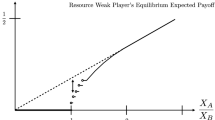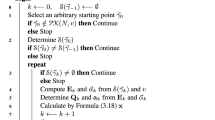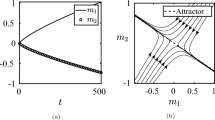Abstract
In this paper we provide new axiomatizations of the Shapley value for TU-games using axioms that are based on relational aspects in the interactions among players. Some of these relational aspects, in particular the economic or social interest of each player in cooperating with each other, can be found embedded in the characteristic function. We define a particular relation among the players that it is based on mutual indifference. The first new axiom expresses that the payoffs of two players who are not indifferent to each other are affected in the same way if they become enemies and do not cooperate with each other anymore. The second new axiom expresses that the payoff of a player is not affected if players to whom it is indifferent leave the game. We show that the Shapley value is characterized by these two axioms together with the well-known efficiency axiom. Further, we show that another axiomatization of the Shapley value is obtained if we replace the second axiom and efficiency by the axiom which applies the efficiency condition to every class of indifferent players. Finally, we extend the previous results to the case of weighted Shapley values.
Similar content being viewed by others
References
Albizuri MJ (2010) Games with externalities: games in coalition configuration function form. Math Meth Oper Res 72: 171–186
Algaba E, Bilbao JM, van den Brink R, Jimenez-Losada A (2003) Axiomatizations of the Shapley value for cooperative games on antimatroids. Math Meth Oper Res 57: 49–65
Casajus A (2011) Differential marginality, van den Brink fairness, and the Shapley value. Theory Decis 71(2): 163–174
Chun Y (1989) A new axiomatization of the Shapley value. Games Econ Behav 1: 119–130
Dubey P (1975) On the uniqueness of the Shapley value. Int J Game Theory 4: 131–139
Grabish M, Lange F (2007) Games on lattice, multichoice games and the Shapley value. Math Meth Oper Res 65: 156–167
Hamiache G (2001) Associated consistency and Shapley value. Int J Game Theory 30: 279–289
Harsanyi JC (1959) A bargaining model for cooperative n-person games. In: Tucker AW, Luce RD (eds) Contributions to the theory of games IV. Princeton UP, Princeton, pp 325–355
Hart S, Mas-Colell A (1989) Potencial, value and consistency. Econometrica 57: 589–614
Kalai E, Samet D (1987) On Weighted Shapley Values. Int J Game Theory 16: 205–222
Khmelnitskaya A, Yanovskaya B (2007) Owen coalitional value without additivity axiom. Math Meth Oper Res 66: 255–261
Kongo T, Funaki Y, Tijs S (2007) New axiomatization and an implementation of the Shapley value. CentER, discussion paper 2007-90
Moretti S, Patrone F (2008) Transversality of the Shapley value. Top 16: 1–41
Myerson RB (1977) Graphs and cooperation in games. Math Oper Res 2: 225–229
Myerson RB (1980) Conference structures and fair allocation rules. Int J Game Theory 9: 169–182
Neyman A (1989) Uniqueness of the Shapley value. Games Econ Behav 1: 116–118
Owen G (1972) Multilinear extensions of games. Manag Sci 18(5): 64–79
Shapley LS (1953a) A value for n-person games. In: Roth AE (ed) The Shapley value. Cambridge UP, pp 41–48
Shapley LS (1953b) Additive and non-additive set functions. Dissertation, Princeton University, Princeton
van den Brink R (2001) An axiomatization of the Shapley value using a fairness property. Int J Game Theory 30: 309–319
Winter E (2002) The Shapley value. In: Aumann RJ, Hart S (eds) Handbook of game theory, vol III, Chap 53. North-Holland, New York, pp 2025–2054
Young HP (1985) Monotonic solutions of cooperative games. Int J Game Theory 14: 65–72
Young HP (1994) Cost allocation. In: Aumann RJ, Hart S (eds) Handbook of game theory, vol II, Chap 34. North-Holland, New York, pp 1193–1235
Author information
Authors and Affiliations
Corresponding author
Rights and permissions
About this article
Cite this article
Manuel, C., González-Arangüena, E. & van den Brink, R. Players indifferent to cooperate and characterizations of the Shapley value. Math Meth Oper Res 77, 1–14 (2013). https://doi.org/10.1007/s00186-012-0412-7
Received:
Accepted:
Published:
Issue Date:
DOI: https://doi.org/10.1007/s00186-012-0412-7




